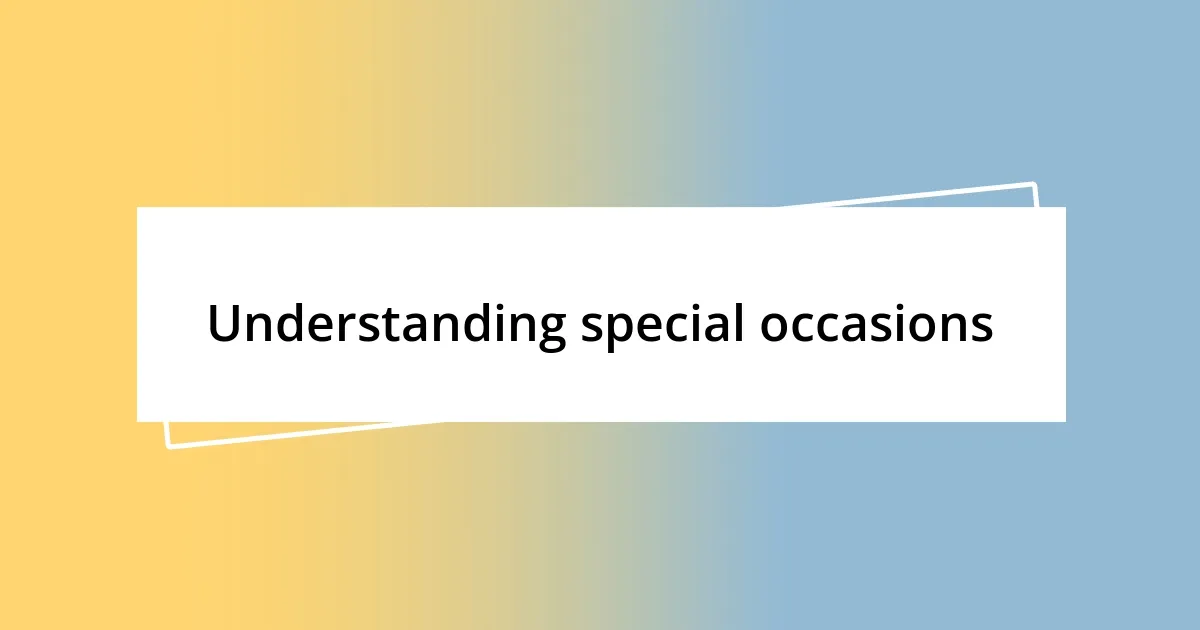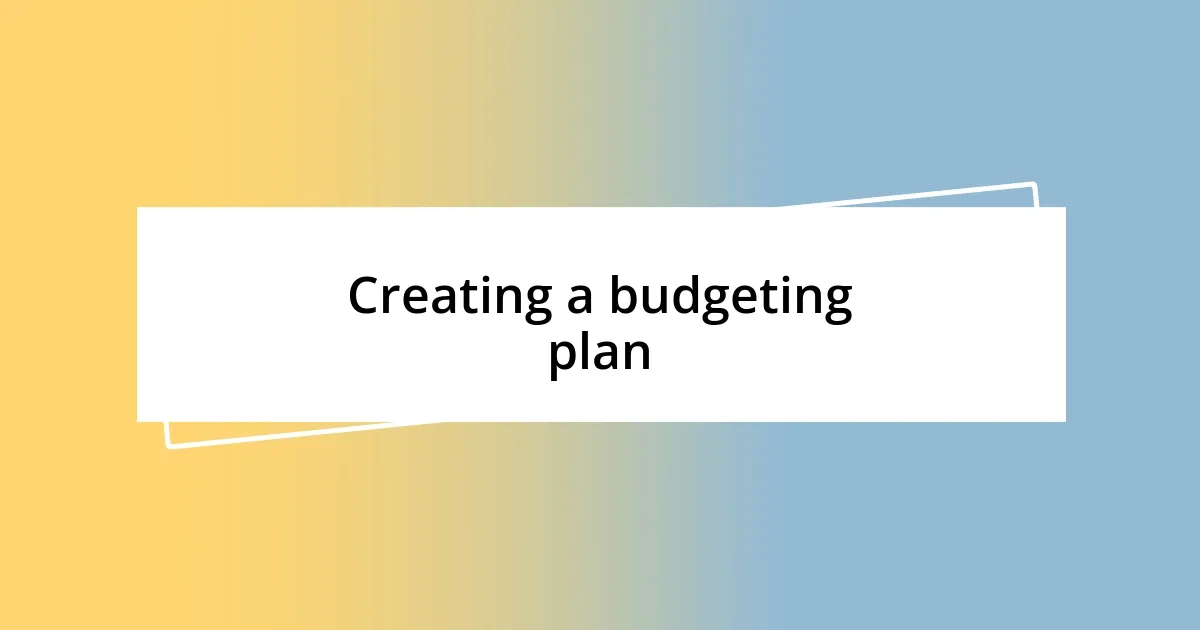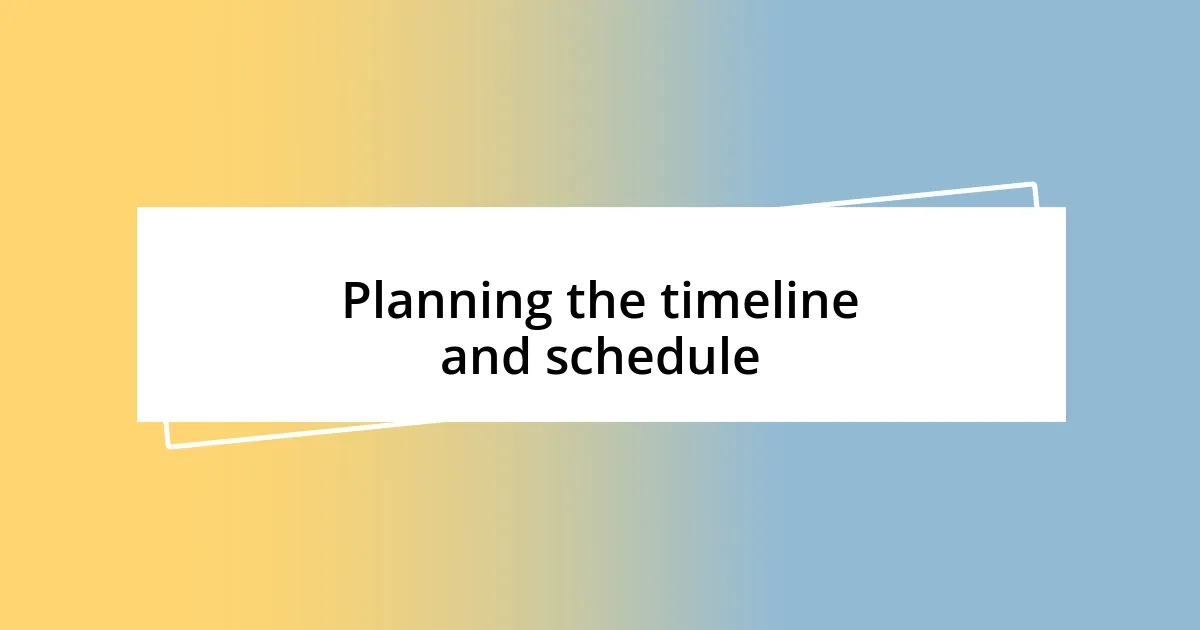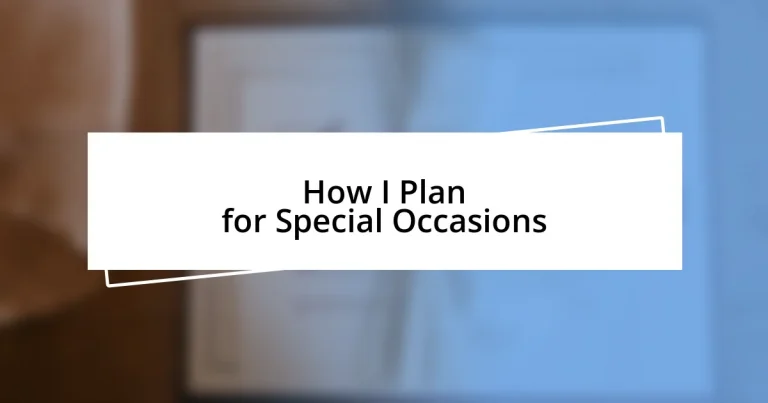Key takeaways:
- Special occasions are emotionally significant moments that foster connection and reflection among loved ones.
- Setting clear goals and creating a budgeting plan are essential for effective planning and to ensure memorable experiences.
- Choosing a theme enhances the atmosphere and cohesiveness of an event, making it more immersive for guests.
- Organizing the guest list and planning a detailed timeline contribute to a smoother event execution and a better overall experience.

Understanding special occasions
Special occasions are moments that resonate deeply within us. They are milestones like birthdays, anniversaries, weddings, or holidays that prompt celebration and reflection. I remember the palpable excitement I felt planning my friend’s surprise birthday party—it was more than just an event; it was a way to show how much we valued our friendship.
Each special occasion carries its own unique emotional weight. For instance, my wedding day wasn’t just a celebration of love; it represented years of dreams and hopes finally manifesting. Have you ever noticed how even the simplest occasions, like a family dinner, can transform into something profound with the right atmosphere? The laughter and shared memories have a way of bonding us closer, making these moments treasured.
Understanding special occasions means recognizing their significance in our lives. They create opportunities to pause and appreciate the present, to connect with loved ones, and to honor the passage of time. What do these occasions mean to you? For me, they’re reminders of joy, love, and the beauty of shared experiences, all wrapped up in fleeting moments we can cherish forever.

Setting goals for planning
When I set out to plan a special occasion, I always start by defining clear, achievable goals. Having goals in mind helps me stay focused and organized throughout the process. For example, when I coordinated a family reunion, my primary goals were to ensure everyone felt included and to create an atmosphere filled with joy and laughter. This clarity allowed me to delegate tasks and make better decisions.
Here’s a quick checklist to help you set your planning goals effectively:
- Identify the occasion: What are you celebrating?
- Establish your budget: How much can you spend?
- Define your guest list: Who do you want to invite?
- Decide on the venue: Where will it take place?
- Set a timeline: When should tasks be completed?
Each of these steps helps me visualize the occasion, ensuring that every detail fits into the larger picture of what I want to achieve. Remember the time I overspent because I didn’t set a budget for a friend’s engagement party? It taught me the importance of sticking to goals to create memorable experiences without unnecessary stress.

Creating a budgeting plan
Creating a budgeting plan is a fundamental step that can make or break your special occasion. Personally, I’ve found that establishing a budget not only alleviates financial strain but also gives me a clearer vision of what I can achieve. For example, during my sister’s wedding planning, I created a spreadsheet with all potential expenses—venue, catering, decorations, and entertainment. This simple act kept my spending in check and reassured me that I wouldn’t overspend in the heat of excitement.
When I craft a budgeting plan, I always categorize expenses into essential and non-essential items. Essentials are the must-haves, while non-essentials are those that can be adjusted based on the budget. This approach came in handy when planning my daughter’s birthday party. I quickly realized that while I desperately wanted a professional balloon artist, it wasn’t crucial to the celebration; instead, I opted for DIY decorations, which ended up being a fun family project and saved a good chunk of money.
Ultimately, tracking your spending as you go can help you stay aligned with your budget. I always use a simple app to record every expense. On one occasion, I forgot to monitor my costs closely for a holiday gathering, and the bill was shockingly higher than expected! Learning from that experience, I now check in regularly, ensuring I can adjust as needed without compromising the joy of the occasion.
| Budgeting Item | Estimated Cost |
|---|---|
| Venue | $1,000 |
| Catering | $800 |
| Decorations | $300 |
| Entertainment | $500 |
| Miscellaneous | $200 |

Choosing a theme or concept
Choosing a theme or concept is one of the most exhilarating parts of planning a special occasion. I remember the time I decided on a vintage carnival theme for my son’s first birthday. I envisioned bright colors, playful games, and an old-fashioned photo booth. This concept not only set the tone but also guided my decisions—from the invitations to the decorations—making everything cohesive and enjoyable.
When it comes to selecting a theme, I always think about the interests of the guest of honor. For my best friend’s surprise party, I knew she adored the ocean, so I opted for a beach-themed celebration, even though it was in the middle of winter. The result? She felt incredibly special, and the decorations helped transport everyone to a sunny place for the evening. Have you ever thought about how a strong theme can elevate an occasion? It allows you to create a narrative that makes the event feel more immersive and memorable for everyone involved.
In my experience, narrowing down the theme requires some reflection and perhaps even a bit of brainstorming. Sometimes, I grab a notebook and jot down various concepts related to the occasion. For instance, when planning a milestone anniversary for my parents, I considered several ideas and finally landed on a “Through the Decades” theme, celebrating their journey together. This choice sparked a wave of nostalgia for all the guests and turned an ordinary gathering into a heartfelt celebration of love and shared memories. Overall, choosing a theme not only makes the planning process more fun but also creates an atmosphere that’s meaningful for everyone.

Organizing the guest list
Organizing the guest list is a key step that can significantly affect the tone and success of any occasion. I recall a time when I overlooked this detail while planning my engagement party and ended up inviting too many people. The venue felt cramped, and I realized that being selective can enhance the intimacy of a gathering. Have you ever considered how the right mix of guests can create a unique energy that makes any event unforgettable?
When I tackle the guest list, I like to start by making a few categories. Initially, I jot down everyone I think should be there and then divide them into “must-haves” and “maybe” lists. For my daughter’s graduation party, this approach helped me focus on family and close friends first. By sticking to those who truly mattered to her, I preserved that personal touch that made the celebration feel special. It’s interesting how sometimes, less is more; the memories created with a smaller, more connected group can last a lifetime.
As I finalize the list, I always think about the dynamics between guests. I once invited a former colleague to a holiday gathering, not realizing they had unresolved issues with another guest. The tension was palpable, which affected everyone’s enjoyment. It taught me that understanding relationships plays a crucial role in creating a pleasant atmosphere. So, when you’re curating your guest list, don’t just list names—think about the connections that might make or break the experience.

Planning the timeline and schedule
Planning the timeline and schedule is essential for a smooth event. It’s like crafting a roadmap for the day’s journey, ensuring everything fits together perfectly. I once tackled a surprise birthday party for my sister, and creating a detailed timeline helped me organize the surprise without a hitch. I sketched out when guests would arrive, when the cake would be served, and even when to dim the lights for the big reveal. Have you ever thought about how a well-structured timeline can alleviate stress? It really does make all the difference.
When I plan, I break down the event into specific time slots. For my son’s graduation, I marked when to set up decorations, when to start cooking, and when guests should arrive. I also factor in some cushion time for unexpected hiccups—like last-minute errands. I believe that giving yourself 15 extra minutes can save a lot of stress. Isn’t it reassuring to know you have some breathing room when things get hectic?
I also make it a point to share the timeline with key helpers ahead of time. At a family reunion last summer, I entrusted my cousin with the cooking schedule, while I focused on coordinating activities. We stayed connected via a group chat, which really kept everyone on the same page. How do you keep everyone informed during an event? A clear timeline not only empowers everyone involved but also ensures that your special occasion flows seamlessly from beginning to end.

Finalizing details and execution
When I’m in the final stages of planning, I focus on ironing out the specific details for execution. It’s almost like preparing for a performance; every detail counts. I remember the first time I attempted to execute a themed brunch for my closest friends. I meticulously arranged the seating, decorated tables to match the theme, and even created a playlist that set the mood. It was amazing how these small touches elevated the entire experience. Have you thought about how even minor details can have a monumental impact on your event?
Once the big aspects are in place, I turn my attention to logistics like confirmation of vendors and rentals. On my brother’s wedding day, I found it crucial to double-check everything—catering, flowers, and even the DJ. I dedicated a day to making calls and ensuring that everything was in sync. It’s true what they say: sometimes, the simplest tasks, like confirming a delivery time, can save you from chaos later. Have you ever felt that moment of relief when a vendor reassures you everything is on track?
Lastly, I always create a quick-reference checklist for the day itself. For my daughter’s sweet sixteen, I put together a list to keep me grounded amidst the excitement. Items like ‘check sound system’ or ‘light candles at 6 PM’ kept me focused on the flow of the event. I found that having this checklist in hand freed my mind to really enjoy the moment, rather than worry about what’s next. Isn’t it satisfying to have tools that allow you to be present while everything around you unfolds?














